|
|
|
Sort Order |
|
|
|
Items / Page
|
|
|
|
|
|
|
| Srl | Item |
| 1 |
ID:
140506
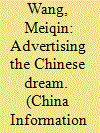

|
|
|
|
|
| Summary/Abstract |
Consumerism is a central feature of urbanism in China and has been actively promoted as a sign of urbanity in the official rhetoric and mass media. This urban ideology is exemplified by the ubiquitous presence of street advertisements that often occupy prominent urban public spaces. After all, turning every citizen of China into a consumer has become a widely accepted Chinese dream and one that is employed to mobilize a population otherwise divided by the ever-widening gap between the rich and poor. Advertisements have assumed a commanding role and are utilized by both official entities and private corporations to promote all kinds of urban consumption, ranging from concrete commodities such as high-end homes, beautiful neighbourhoods, and luxurious goods to intangible symbols such as lifestyle, ideology, and cosmopolitan identity. All these have fallen under the scrutiny of the Shanghainese artist Ni Weihua, whose photography documents billboards advertising official ideologies and real-estate projects in Shanghai and other cities. This study brings into context Ni’s artistic practice and examines specific ways in which his photographic series Keywords (关键词) and Landscape Wall (风景墙) engage with formal advertisements in the street both as an urban reality and as a site for deconstruction.
|
|
|
|
|
|
|
|
|
|
|
|
|
|
|
|
| 2 |
ID:
138128


|
|
|
|
|
| Summary/Abstract |
In November 2012, soon after the conclusion of the 18th National Congress of the Communist Party of China (CPC), President Xi Jinping put forward for the first time the idea of the ‘Chinese Dream’. In March 2013, Xi further elaborated on this concept at the closing ceremony of the First Session of the 12th National People’s Congress. Xi’s concept of the Chinese Dream involves better education, more stable employment, higher incomes, a greater degree of social security, better medical and health care, improved housing conditions, a better environment, satisfactory jobs and better lives for the Chinese people. In foreign affairs, Xi emphasised that the Chinese Dream stands for peace, development, cooperation and mutual benefit for all. These are all unexceptional sentiments that could have been expressed by any national leader and thus few would disagree with Xi’s laudable thoughts. But what is the position on the ground and how is China faring under Xi Jinping’s rule in the achievement of these goals?
|
|
|
|
|
|
|
|
|
|
|
|
|
|
|
|
| 3 |
ID:
129686
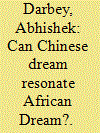

|
|
|
|
|
| Publication |
2014.
|
| Summary/Abstract |
Chinese Dream was officially put forward on November 29, 2012 by the Chinese general Secretary Xi jinping in the meeting of 18th national congress of the communist party of China, as the important guideline ideology and important governance philosophy. Xi defined Chinese dream as to achieve the great rejuvenation of Chinese nation in the greatest dream of the Chinese nation in modern times. The core objective of the Chinese dream can be summarized as the goal of "two Hundred Year", which can be elaborated as, the year 2021 is the 100th anniversary of the communist party of China and the year 2049 is the 100th anniversary of the Peoples Republic of China.
|
|
|
|
|
|
|
|
|
|
|
|
|
|
|
|
| 4 |
ID:
143614
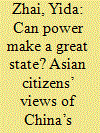

|
|
|
|
|
| Summary/Abstract |
With its rapid economic growth, China has become the second largest economy. At the same time, a rapid increase in its defense expenditure and expanding maritime ambitions have raised concerns among other Asian nations. Moreover, by displaying its economic and military might China’s recent assertive actions in the East China Sea and South China Sea seem to “prove” longstanding worries regarding China’s threats. This article reviews the traditional Chinese philosophy of the great state and argues that China unfortunately deviates from it. Cross-national survey data show that Asian citizens widely acknowledge the rising power of China. Nevertheless, an expansion of economic and military power fails to yield more positive evaluations. The country’s pursuit of power and blunt foreign policy push neighboring states to welcome an expansion of Japan’s military role and to intensify their security ties with the United States to achieve a balance of power. There needs to be a shift in China’s foreign policy to earn trust and respect from its Asian neighbors. Power can create a hegemon but it definitely will not make China a great state
|
|
|
|
|
|
|
|
|
|
|
|
|
|
|
|
| 5 |
ID:
130193


|
|
|
|
|
| Publication |
2014.
|
| Summary/Abstract |
In 2013, China's new party and state leadership specified its domestic and foreign policies in the context of Xi Jinping's vision of the ''Chinese Dream.'' A new reform package modifying China's growth and development model has been announced. In foreign policy, a debate has commenced regarding another side of the ''Chinese Dream'': China's rise as a ''Great Power.''
|
|
|
|
|
|
|
|
|
|
|
|
|
|
|
|
| 6 |
ID:
137526
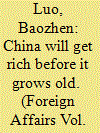

|
|
|
|
|
| Summary/Abstract |
At a conference on the Chinese economy in 2012, Cai Fang, a demographer at the Chinese Academy of Social Sciences, issued a dire warning: “There’s now no doubt China will be old before it is rich.” He was expressing a view widely held by economists and China watchers. Over the past 65 years, life expectancy in China has more than doubled, from 35 years to roughly 75, as the fertility rate has plunged. Many fear that if these trends continue, China’s population will age faster than the country can accommodate. In 2014, the share of China’s population older than 60 reached roughly 15 percent; demographers predict that figure will double by 2050, reaching the equivalent of nearly 450 million people, or about one-quarter of the world’s elderly
|
|
|
|
|
|
|
|
|
|
|
|
|
|
|
|
| 7 |
ID:
164970
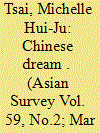

|
|
|
|
|
| Summary/Abstract |
Starting from Xi Jinping’s political initiative the Chinese Dream, this paper examines its capitalist and nationalist discourse constructed through the nation’s disciplinary system, and seeks to unravel how it is enmeshed with business operations in mainland China. The paper argues that Taiwanese businesspersons play an ambiguous role in the dream as both “foreign” and “Chinese” investors.
|
|
|
|
|
|
|
|
|
|
|
|
|
|
|
|
| 8 |
ID:
189276
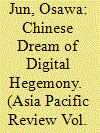

|
|
|
|
|
| Summary/Abstract |
China holds a long-term national strategy called the “Chinese Dream” to overtake the United States to become the world’s leading hegemonic power by 2049. As a policy to realize the “Chinese Dream,” China has launched the “Digital Silk Road Initiative” and is developing an IoT platform on an information and telecommunications infrastructure in an attempt to capture the power to control information from the United States by enclosing information not only in the Eurasian continent but also in the world.
|
|
|
|
|
|
|
|
|
|
|
|
|
|
|
|
| 9 |
ID:
191560
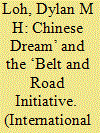

|
|
|
|
|
| Summary/Abstract |
The ‘Chinese Dream’ (CD) and the ‘Belt Road Initiative’ (BRI) are signature programs of President Xi Jinping. Much of the scholarships on these two projects have concerned itself with either domestic propagandistic effects or external foreign policy impact. These concerns have underpinned the literature’s focus on material expressions of such projects, be it through infrastructural construction in the case of the BRI or propaganda tools in the example of the CD. Yet, an important but understudied element of these two projects is the narratives that they tell and the impact of these narratives. In that regard, this article complements existing studies of the CD and the BRI by reading the projects as grand narratives. Drawing on international practice theory, I trace an explicit link between narratives and practices to demonstrate how narratives activate, anchor, produces and contest political practices of some sub-state actors in China. That is to say narratives: (i) serve as signposts for sub-state actors’ orientations in clarifying what are relevant/irrelevant and appropriate/inappropriate practices; (ii) provide ‘background’ stock of information where actors draw on to legitimize their practices when they speak of the BRI and CD; and (iii) create conditions for both the creation of new practices and contestation of existing ones. I then argue that four narrative-practice processes are seen in the Chinese example: contestation, sustenance, activation, and production.
|
|
|
|
|
|
|
|
|
|
|
|
|
|
|
|
| 10 |
ID:
149043
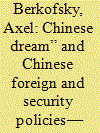

|
|
|
|
|
| Summary/Abstract |
The “China Dream” announced by Chinese President Xi Jinping’ in 2012 paints a very rosy picture of China under his seemingly undisputed leadership: China's economic and political rise will be beneficial to China and indeed the international community putting Beijing on top of the list of “peace-loving” countries. Reality, however, as it turned out over the last four years, is distinctively different as a number of countries in China's neighborhood and beyond can surely confirm. Indeed, Beijing unilaterally claiming and building civilian and military facilities on disputed islands in the South China Sea are arguably the very opposite of a peaceful contribution to world politics and security facilitated by the rhetorical hype of Xi's “Chinese Dream.” While outside observers can be excused for concluding that the “Chinese Dream” mantra is directed at the Chinese domestic audience to distract from the very many economic, environment and social problems within China, the consequences of Beijing's “dreaming” of re-gaining its former undisputed “Middle Kingdom” status in Asia are very much felt abroad. This, it is argued, could be the time when “dreams” turn into “nightmares” for those at the receiving end of Beijing's dream.
|
|
|
|
|
|
|
|
|
|
|
|
|
|
|
|
| 11 |
ID:
165961
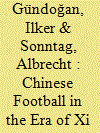

|
|
|
|
|
| Summary/Abstract |
Football has become a field of high priority for development by the central government of the People's Republic of China. After Xi Jinping took office as General Secretary of the Chinese Communist Party in 2012, a football development strategy was launched, including four “comprehensive” reforms. The purpose of this study is to examine the perceptions of these reforms by Chinese football supporters – a fundamental stakeholder group – through an online survey. Particular emphasis was laid on how nationalistic attitudes underpin supporters' expectations, especially with regard to the concept of the “Chinese Dream.” In addition, issues of football governance were also addressed.
|
|
|
|
|
|
|
|
|
|
|
|
|
|
|
|
| 12 |
ID:
162791
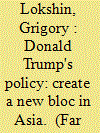

|
|
|
|
|
| Summary/Abstract |
The content of the new Asian doctrine of US President Donald Tramp and his plans to form a "Quad" is the first step toward creating a new type of military bloc for Asia in order to contain China. This topic is highly relevant because of the changing situation in the wider region where Russia has its own major economic and geostrategic interests. The plans to form the Quad directly threaten the marginalization of ASEAN and the end of the Association's leading role in resolving regional issues.
|
|
|
|
|
|
|
|
|
|
|
|
|
|
|
|
| 13 |
ID:
124199
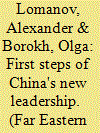

|
|
|
|
|
| Publication |
2013.
|
| Summary/Abstract |
This article is devoted to the new trends in China's policy after the 18th CPC Congress. The unveiling of the slogan "The Chinese Dream" of a "Great Rebirth of the Nation" opened up new prospects for consolidating society around the objectives of development. The Chinese leadership stresses the complicated nature of future reforms and the need to overcome the growing resistance to further changes.
|
|
|
|
|
|
|
|
|
|
|
|
|
|
|
|
| 14 |
ID:
139648
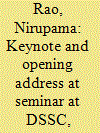

|
|
|
| 15 |
ID:
158265


|
|
|
|
|
| Summary/Abstract |
The papers in this research dialogue section are the product of a project that examines intellectual life in China since the 1990s – chiefly the efforts by academic public intellectuals to rethink China’s past, present, and future in light of the excesses of Mao’s revolution, the challenges emerging from reform, and the rise of China to the status of world economic power. Chinese scholars, having benefited from China’s openness to the world and the relative relaxation of political pressure in China (until recently), have much to say about China and the world that merits our attention. Through creative collaboration between Chinese and international scholars, the articles collected here explore that intellectual public sphere since the late 1990s. The articles were written in Chinese by young PRC scholars and rendered into English through ‘collaborative translation’ teams that pair these Chinese with non-Chinese scholars based in Canadian universities. The net result, grounded on repeated conversations and revisions, is not a simple translation but a co-production of knowledge about China that aims to capture the discourse of Chinese scholarship in a way to make it meaningful to anglophone readers. The articles themselves are not traditional surveys of academic scholarship. Rather they map significant areas of an intellectual world and the arguments within it. Three widely accepted intellectual streams of thought (sichao 思潮) organize these soundings: liberals, New Left, and New Confucian. These reports explore connections between and diversity within and beyond each.
|
|
|
|
|
|
|
|
|
|
|
|
|
|
|
|
| 16 |
ID:
167064
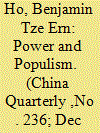

|
|
|
|
|
| Summary/Abstract |
Singapore's political system is sometimes criticized by proponents of liberal democracy as being highly authoritarian and inhibiting of individual freedom. Yet, as the recent 2015 general elections show, Singaporeans have largely consented to such a model as a legitimate social contract between themselves and the government. Given that the Singapore model is widely studied by Chinese officials as a positive pattern for governance, what do the latest results say about the future of the Chinese governing system, and to what extent is the Communist Party able to wield power while catering to populist sentiments, in particular the achievement of the Chinese dream?
|
|
|
|
|
|
|
|
|
|
|
|
|
|
|
|
| 17 |
ID:
183133


|
|
|
|
|
| Summary/Abstract |
The Communist Party of China (CPC) completed 100 years of its existence in July 2021, with the last 70 plus years spent as the ruling party in China. The centenary occasioned a fresh consideration by the CPC of the challenges to its identity, legitimacy and power. Using select speeches and commentaries produced by the CPC in the context of the centenary, this article analyses how the Party deploys discourses on its history to articulate its concerns and promote its interests today. It also looks at how these interpretations of the Party’s history and role in China translate into a growing sense of exceptionalism in the Party-state. The article argues that despite frequent calls to ‘seek truth from facts’, an overriding desire to retain power is once again pushing the CPC down the path towards dogmatism.
|
|
|
|
|
|
|
|
|
|
|
|
|
|
|
|
| 18 |
ID:
136742
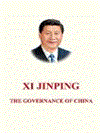

|
|
|
|
|
| Publication |
Beijing, Foreign Language Press Co.Ltd, 2014.
|
| Description |
515p.Pbk
|
| Standard Number |
9787119090573
|
|
|
|
|
|
|
|
|
|
|
|
Copies: C:1/I:0,R:0,Q:0
Circulation
| Accession# | Call# | Current Location | Status | Policy | Location |
| 058117 | 923.251/JIN 058117 | Main | On Shelf | General | |
|
|
|
|
| 19 |
ID:
193180
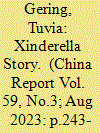

|
|
|
|
|
| Summary/Abstract |
The China Story, also known as Xi Jinping’s Chinese Dream of the Great Rejuvenation of the Chinese Nation, is widely accepted as the central narrative for the leadership’s ideological and political legitimacy-building efforts. Despite its significance and the widespread attention it has received in the decade since its inception, surprisingly little literature has examined the Chinese Dream through the lens of narrative theory. This article seeks to close this gap by offering a structural narratological analysis of the China Story. It illuminates how the narrative comprises policy-oriented rhetorical frames that form overarching themes that direct party-state actions and support Xi Jinping’s status as the ‘core’ leader. The paper argues that as a ‘master narrative’, it seeks to provide a spiritual foundation and a compelling vision of a strong, prosperous, and unified China under the rule of the Chinese Communist Party.
|
|
|
|
|
|
|
|
|
|
|
|
|
|
|
|
| 20 |
ID:
137528
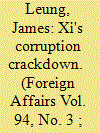

|
|
|
|
|
| Summary/Abstract |
In a series of speeches he delivered shortly after taking office in 2012, Chinese President Xi Jinping cast corruption as not merely a significant problem for his country but an existential threat. Endemic corruption, he warned, could lead to “the collapse of the [Chinese Communist] Party and the downfall of the state.” For the past two years, Xi has carried out a sweeping, highly publicized anticorruption campaign. In terms of sheer volume, the results have been impressive: according to official statistics, the party has punished some 270,000 of its cadres for corrupt activities, reaching into almost every part of the government and every level of China’s vast bureaucracy. The most serious offenders have been prosecuted and imprisoned; some have even been sentenced to death.
|
|
|
|
|
|
|
|
|
|
|
|
|
|
|
|
|
|
|
|
|